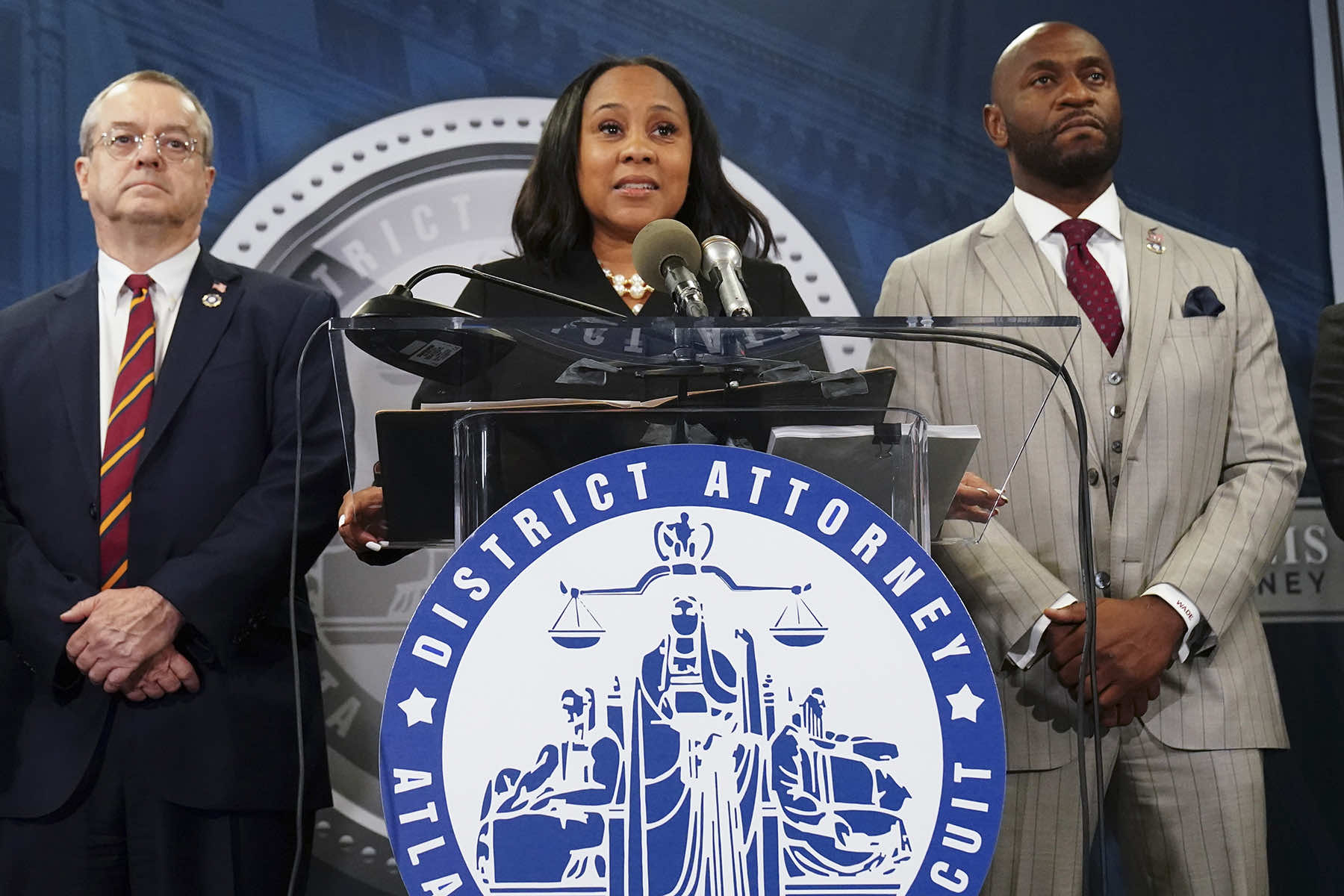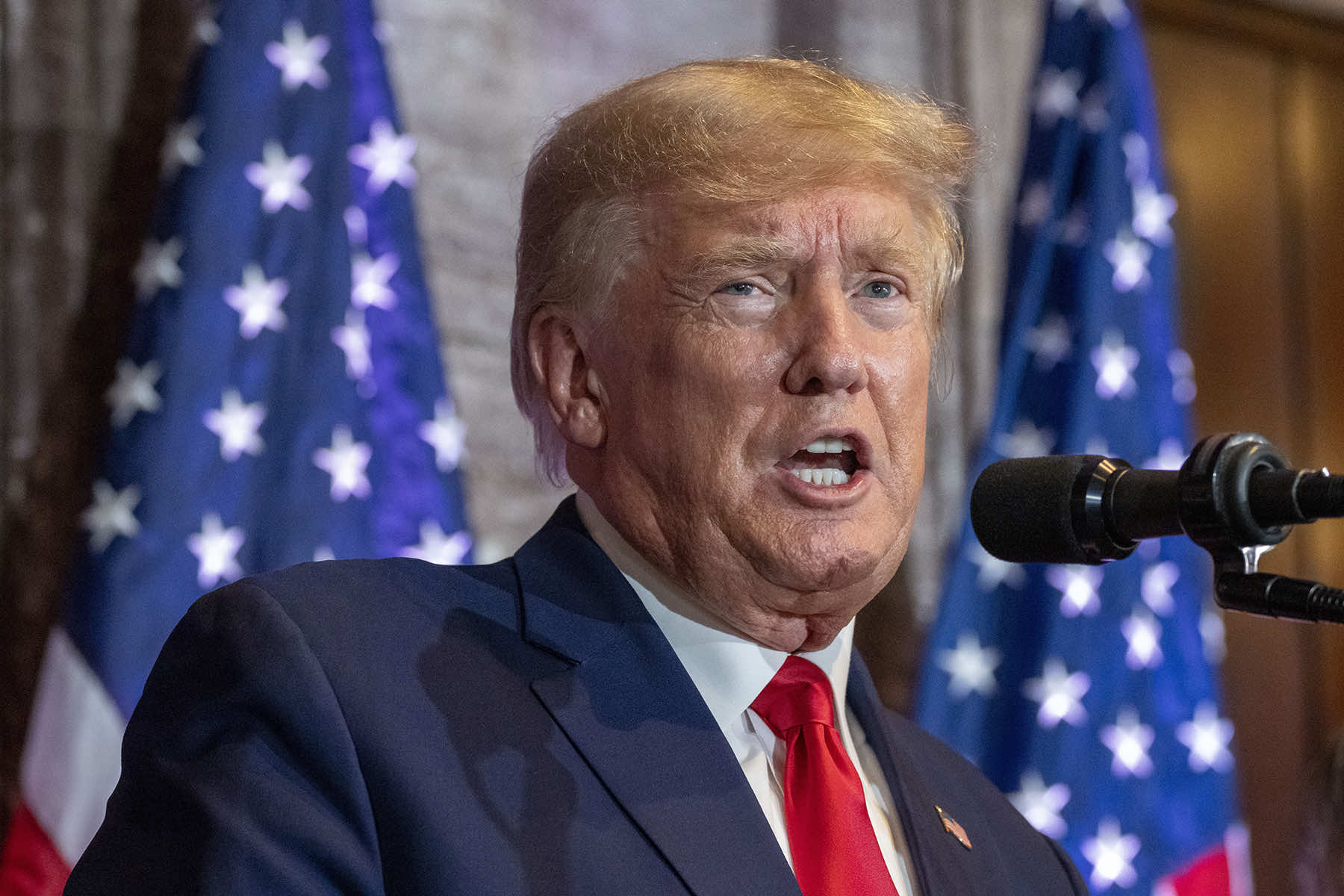
The fourth indictment of former President Donald Trump may be the most sweeping yet. The sprawling, 98-page case unveiled on August 14 opens up fresh legal ground and exposes more than a dozen of Trump’s allies to new jeopardy.
But it also raises familiar legal issues of whether the First Amendment allows a politician to try to overturn an election. Already, Trump and his supporters are alleging the indictment is politicized. Here are some takeaways from the August 14 indictment:
THE BIG ONE
This may be the last of the Trump indictments, but it was the big one. The indictment lists 18 defendants in addition to Trump, all joined together by Georgia’s unusual anti-racketeering, or RICO, law.
Many of the defendants are not even based in Georgia. The better-known defendants include former New York Mayor Rudolph Giuliani and attorney Sidney Powell, who appeared in numerous hearings and on television spreading false claims about unfounded incidents of purported election fraud. Giuliani and Powell were among the unnamed co-conspirators in the federal indictment against Trump for his push to overturn the election that was released earlier this month.
Others, however, had to date escaped mention in charging documents, like Trump’s then-chief of staff Mark Meadows, who was on the call during which Trump urged Georgia election officials to “find” him the votes he needed to be declared winner of the state.
Other defendants include Mike Roman, a Trump campaign official who the indictment alleges helped arrange slates of fake Trump electors whose votes Congress could count rather than those of the actual appointed ones for the winner of the election, President Joe Biden. Another person charged is Jenna Ellis, who has become a prominent conservative legal personality after working on the Trump campaign and helping spread Trump’s false allegations of widespread fraud.
The charges also fall upon several Georgia players, including Ray Smith and Robert Cheeley, lawyers working for Trump in Georgia, and David Shafer, then the state GOP chairman, for serving as a fake Trump elector along with fellow co-defendants Shawn Still, then the state GOP finance chairman, and Cathleen Alston Latham.
A WIDER APPROACH
Critics may argue this is an overreach for a local prosecutor’s office. But the Georgia RICO statute gives Fulton County District Attorney Fani Willis’ office the ability to construct a wide-ranging narrative by citing and charging other players in the alleged wrongdoing, even those out of state.
Some legal analysts think that Jack Smith, the federal prosecutor who filed the earlier charges against Trump for trying to overturn the election, did not charge people identified as co-conspirators in his case, like Giuliani, because he is aiming for a trial as quickly – and with as much time as possible before the 2024 presidential election — as feasible.
Willis on August 14 said she hoped for a trial date in six months. But her office is taking a notably different, more sweeping approach from the more streamlined federal indictment. She vowed that she would seek to try all 19 defendants together.
THE FIRST AMENDMENT ARGUMENT
Trump is expected to employ a similar defense in both the earlier federal indictment and the Fulton County case. He and his supporters contend he is being charged simply for speaking up against what he saw as an unfair election and practicing politics as usual. But it is not clear that defense will work.
Prosecutors in Trump’s Federal indictment to overturn the 2020 election anticipated that response, explicitly conceding in the indictment that Trump had the First Amendment right to lie about election fraud. The indictment argued instead that Trump broke the law when his lies transformed into actions, from attempts to overturn the election to obstructing official proceedings and conspiring to block citizens’ right to have their vote counted.
Some of the 161 acts that Georgia prosecutors contend were part of the conspiracy to overturn may sound like protected political machinations in isolation – emails and texts about meetings of people contending to be Trump electors, tweets about alleged voter fraud, even the filing of a lawsuit in Georgia challenging the election outcome.
But the indictment argues they were all steps in what it calls “a conspiracy to unlawfully change the outcome of the election in favor of Trump.” For example, it alleges that those fake elector meetings were part of an attempt to convince Georgia state lawmakers to “unlawfully” appoint the phony Trump electors, rather than the Biden ones they were bound to by law.
The indictment contends the tweets about phony voter fraud and even the lawsuit were part of a similar scheme. And, finally, it said some of the lies trying to persuade Georgia’s top election official, Secretary of State Brad Raffensperger, and Governor Brian Kemp to declare Trump the victor could be considered another crime under state law, solicitation of violation of oath by a public officer.
TRUMP’S MOUNTING LEGAL BILLS
The sheer number of investigations, criminal cases and lawsuits brought against Trump are unprecedented for a former president. The same could be said for the tens of millions of dollars in legal fees paid out to attorneys representing him and his allies, straining the finances of his campaign.
An analysis of recent fundraising disclosures shows Trump’s political committees have paid out at least $59.2 million to more than 100 lawyers and law firms since January 2021. The threat posed by this colossal drain of resources has led Trump’s allies to establish a new legal defense fund.















